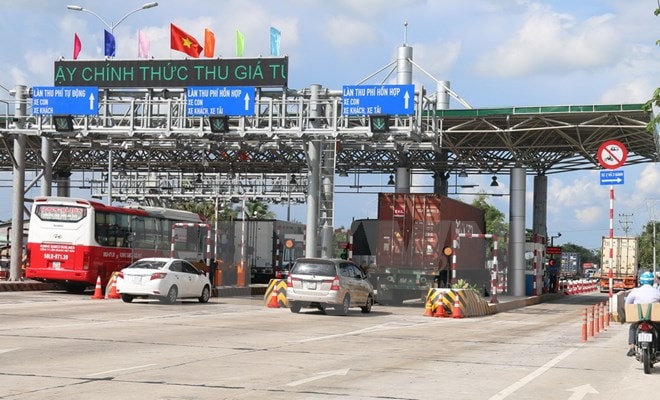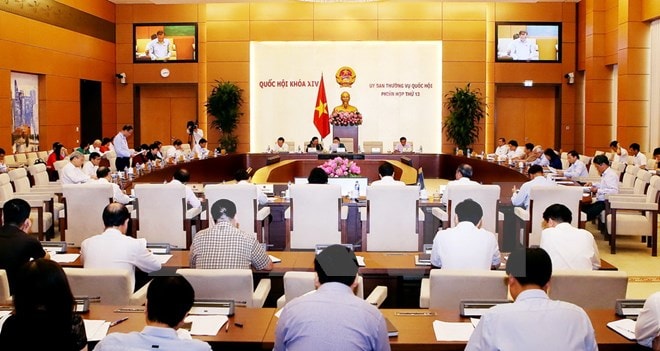Vice Chairman of the National Assembly: Avoid a recurrence of the incident at Cai Lay toll station
Continuing the 13th Session, on the morning of August 15, the National Assembly Standing Committee conducted thematic supervision on "Implementation of policies and laws on investment and exploitation of transport works under the form of build-operate-transfer (BOT) contracts." Vice Chairman of the National Assembly Phung Quoc Hien chaired the meeting.
 |
| Cai Lay toll station. (Photo: Minh Tri/VNA) |
BOT is the right direction
Presenting the report on monitoring results, Chairman of the Economic Committee, Head of the Monitoring Delegation of the National Assembly Standing Committee Vu Hong Thanh stated that the implementation of BOT investment transport projects in recent times has clearly changed the appearance of the transport system, especially the road and bridge system, promoting efficiency, saving time and travel costs, and increasing the competitiveness of the economy.
In the 2011-2016 period, the Ministry of Transport mobilized over VND171,000 billion, of which BOT capital was over VND154,000 billion/59 projects, accounting for about 90.2%. To date, 55 BOT projects have been completed and put into operation with a total investment of nearly VND138,000 billion.
According to reports from 43 provinces and centrally run cities, localities have mobilized more than VND80,000 billion for BOT projects. Many key projects with high connectivity between regions have been invested with socialized capital (expansion of National Highway 1, Ho Chi Minh Road section through the Central Highlands...).
Chairman of the Economic Committee Vu Hong Thanh emphasized that in the context of limited state budget resources and gradually shrinking ODA resources, mobilization through the form of BOT contracts is the right direction to develop transportation in particular and economic development in general, while reducing the burden of the state budget in implementing the policy of building synchronous infrastructure for the economy.
The majority of people participating in traffic enjoy better and more complete public services and goods at a reasonable cost. The results and experiences gained in implementing BOT traffic projects have affirmed the right direction of the investment model in the form of PPP, which needs to continue to be developed and expanded to other economic sectors. This is also the basis for the State to improve legal policies, improve efficiency and attract more and more investors to participate, especially foreign investors.
However, the report of the Supervisory Delegation also frankly pointed out many limitations and shortcomings from the issuance of policies to the actual implementation. Accordingly, the implementation of strategies and plans for infrastructure development lacks principles and priorities. The work of establishing, appraising and approving projects is still inadequate. The determination of the project's financial plan is still unreasonable... In particular, the work of collecting service fees still has many shortcomings: The location of toll stations and the distance between stations are not reasonable. The prescribed service price framework is very broad, easily leading to negativity.
In addition, the consultation process on the location of the toll station has not yet consulted with people near the station, professional social organizations, and people who regularly use the road... causing people to be upset and protest for a long time. In particular, in many cases, the toll has increased but the quality of the construction has seriously degraded, forcing people to pay for disproportionate service quality.
Review the location of toll stations for BOT projects
Discussing at the meeting, although highly appreciating the impact of the BOT form on socio-economic infrastructure, especially the road traffic system, members of the National Assembly Standing Committee agreed that this form still has some shortcomings, mainly due to subjective factors.
 |
| Overview of the meeting. (Photo: Nguyen Dan/VNA) |
Chairman of the Foreign Affairs Committee Nguyen Van Giau raised the issue of toll collection on the only roads left by our ancestors. Many roads are very short but are still built under the BOT model, leading to public protests. To resolve this situation, Chairman of the Foreign Affairs Committee Nguyen Van Giau proposed to reconsider the toll collection on the only roads. If necessary, open a new toll road next to the old road for people to choose.
[People will be able to monitor the time and toll collection of BOT stations]
Commenting on toll collection for BOT projects, Vice Chairman of the National Assembly Do Ba Ty pointed out that the distance between toll stations and toll rates are the source of all reactions from the people. Citing the incident of people using coins to pay tolls causing traffic jams at Cai Lay Toll Station (Tien Giang) in recent days, Vice Chairman of the National Assembly Do Ba Ty suggested that this issue needs to be further clarified, stating the cause and solutions to avoid recurrence.
Vice Chairman of the National Assembly Do Ba Ty said that the State needs to buy back the right to collect tolls at stations that do not ensure a minimum distance of 70km or more to avoid public frustration. In particular, it is necessary to conduct a comprehensive review to develop a plan for traffic works implemented under the BOT contract form, so that this policy can be systematically implemented in the coming time. In addition, the State needs to step up inspection, examination, strictly handle violations, and closely monitor road traffic toll collection to ensure transparency and publicity.
Agreeing with this view, members of the National Assembly Standing Committee recommended that in the coming time, the Government should urgently direct the completion of the review of current toll station locations, issue criteria for establishing toll stations for road use services, and develop appropriate toll rates. The Government should consider and apply advanced technology (non-stop toll collection) to ensure publicity and transparency in toll collection activities, develop mechanisms and apply technology to closely monitor the revenue of toll stations for road use services; by 2019, non-stop toll collection will be synchronously deployed on all national highways nationwide.
Perfecting legal regulations on BOT investment
Speaking at the discussion session, National Assembly Chairwoman Nguyen Thi Kim Ngan affirmed that the policy of mobilizing non-budgetary capital to invest in infrastructure in general, including transport infrastructure in particular, is completely correct and has been implemented quite well in recent times. Many key national projects and important routes have been invested in and built, promoting socio-economic development of the region as well as the whole country.
National Assembly Chairwoman Nguyen Thi Kim Ngan pointed out the causes of limitations and shortcomings in the implementation and organization of policies and laws on investment and exploitation of transport works under the BOT form in recent times. That is, the system of legal documents regulating this form of investment is not complete and synchronous. While there is no final assessment of the development and implementation of laws, investment is quite massive. The implementation of planning between sectors and fields is not consistent, lacking synchronous planning of the transport system.
The process of establishing, examining and approving BOT projects is still inadequate, leading to many projects adjusting their investment levels. In addition, the selection of investors is still limited; most of the projects in the past were designated bidders, reducing the competitiveness and investment efficiency of the projects.
National Assembly Chairwoman Nguyen Thi Kim Ngan suggested that in the coming time, State agencies need to continue reviewing and perfecting legal regulations on BOT investment; research and submit to the National Assembly for promulgation of the Law on Public-Private Partnership to create a unified and synchronous legal basis; create a strong enough legal corridor to ensure that the State and private sectors properly perform their contractual obligations. While the Law has not yet been promulgated, the Government needs to proactively research, amend and adjust unreasonable and limited regulations in practice. State management agencies need to enhance their responsibility in preparing, appraising and approving projects; strengthen supervision and inspection of investors' implementation during the project implementation, operation and maintenance and the final handover phase to ensure that after the toll collection period ends, the project handed over to the State still ensures operational quality./.
According to Vietnam +
| RELATED NEWS |
|---|

